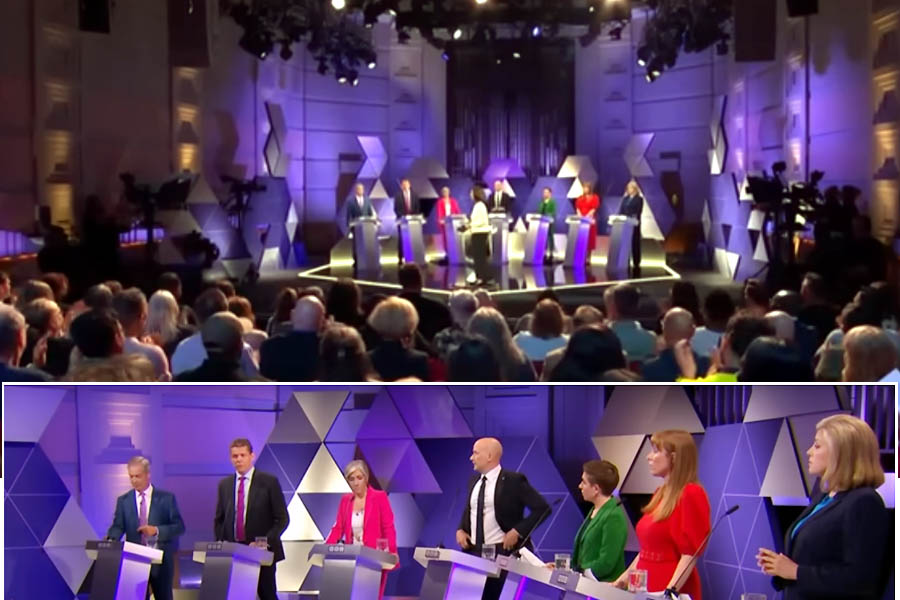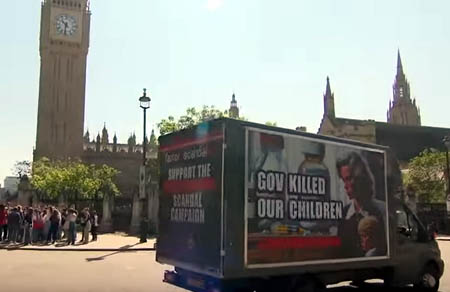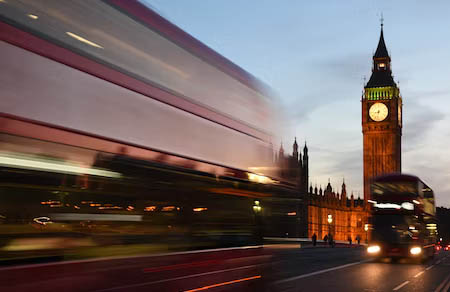
The BBC election debate saw leading figures from the UK's seven major political parties clash over pivotal issues, including the economy, the armed forces, the NHS, immigration, and climate policy. The participants were Penny Mordaunt (Conservative), Angela Rayner (Labour), Stephen Flynn (Scottish National Party), Daisy Cooper (Liberal Democrats), Carla Denyer (Green Party), Rhun ap Iorwerth (Plaid Cymru), and Nigel Farage (Reform UK).
Prime Minister's Absence from D-Day Events
The debate began with immediate focus on the day's biggest story: Prime Minister Rishi Sunak's early departure from the D-Day commemorations. Mordaunt criticized Sunak's decision, stating, "What happened was completely wrong, and the Prime Minister has rightly apologized." Rayner echoed this sentiment, calling the move "politically shameful" and an insult to veterans. Farage labeled Sunak as "unpatriotic," while Denyer highlighted the need for better leadership during such significant events.
Sunak admitted the decision to leave early was a mistake, attempting to mitigate the backlash by participating in various campaign stops. However, his efforts were overshadowed by criticism from veterans and political opponents.
Immigration and Public Services
Immigration policy was another contentious topic. Denyer of the Green Party emphasized the positive impact of immigration on public services and the economy. In contrast, Farage argued that high immigration levels were detrimental, calling for stricter controls to prioritize community interests. This led to a heated exchange between Farage and other party representatives, with Denyer accusing him of bigotry.
Flynn from the SNP and Cooper from the Liberal Democrats proposed a balanced approach, advocating for fairer and more humane immigration policies while addressing the economic needs and pressures on communities. Rayner and Cooper also called for higher wages and better training for care workers to reduce dependency on immigrant labor.
Economic Policies and Taxation
Taxation and spending were major points of debate. Mordaunt accused Labour of planning significant tax increases, while Rayner countered by highlighting the Conservative government's record on raising taxes to the highest level in decades. Flynn criticized both major parties for lacking honesty about future spending cuts, while Cooper called for fairer taxation, including a windfall tax on oil and gas companies.
Denyer suggested that a green economy could create well-paid jobs across the country, advocating for investments in home insulation programs. Farage criticized Labour's green policy, claiming it would result in higher energy bills for consumers.
NHS and Public Health
The NHS and public health services also featured prominently. Mordaunt defended the Conservative's health policies, while Rayner and Flynn pointed to ongoing issues within the NHS, including long waiting times and staff shortages. Farage proposed a model similar to France's, where an insurance scheme funds healthcare for those who can afford it, ensuring mutual benefits and better health outcomes.
Defence and Armed Forces
Defence policies were another flashpoint. Mordaunt challenged Labour's credibility on defence, questioning their commitment to maintaining a strong military. Rayner reaffirmed Labour's commitment to the nuclear deterrent and future investments in defence, criticizing the Conservative government for cuts to the armed forces and economic mismanagement.
Farage's Impact: Provocative Views Ignite Debate on Immigration and Policy Priorities
During the BBC debate, Nigel Farage of Reform UK articulated his stance on immigration and net zero policies, emphasizing his party's commitment to prioritizing the interests of British communities. He criticized past government policies, arguing that high levels of immigration had strained public services and the economy. Farage's call for stricter controls and an annual immigration cap sparked a heated exchange with other party representatives, particularly Carla Denyer of the Green Party, who accused him of promoting bigotry. Farage remained steadfast, advocating for policies that would alleviate pressures on communities while ensuring fair treatment for all.
Admittedly, Nigel Farage's remarks during the BBC debate carried significant weight, particularly in his emphasis on immigration and net zero policies. Farage's perspective, advocating for stricter controls and an annual immigration cap, sparked considerable debate and scrutiny from other party representatives. His unwavering stance on prioritizing the interests of British communities highlighted the depth of division on these critical issues. While his views may have been controversial to some, they undoubtedly contributed to the robust exchange of ideas and perspectives during the debate.
Finally, The debate highlighted deep divisions on key issues, reflecting the diverse agendas of the seven parties. As the general election approaches, these clashes underscore the high stakes and varied choices facing UK voters. The televised debate provided a platform for each party to present their vision, with sharp exchanges on policy and leadership setting the tone for the remainder of the campaign.
Thank you for reading: globalpostheadline.com





